Migrants: What can Europe achieve?
- Published
How can EU address its migrant issue?
As the number of migrants crossing the Mediterranean to reach Europe soars to more than 100,000, European leaders are struggling to come up with solutions.
Plans to resettle tens of thousands of migrants across Europe and break up the smuggling networks have yet to be agreed.
European ministers discussed the plans on 16 June, but there were objections to relocating migrants according to mandatory quotas.
Everyone agrees that Europe has to find some big solutions to a big problem. And soon.
But what can European countries actually achieve?
What does the EU want to do with the new arrivals?
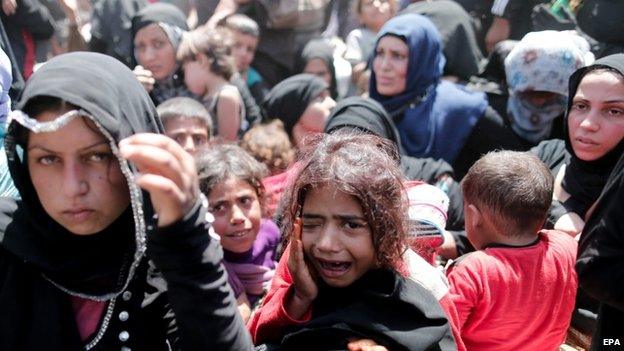
Women and children from Syria taking refuge in Turkey
The European Commission wants to adopt "immediate measures to prevent human tragedies and to deal with emergencies".
It's widely acknowledged that the current wave of migration across the Mediterranean is just such an emergency.
Article 78(3) of the 2007 Lisbon Treaty allows for provisional measures to address "an emergency situation characterised by a sudden inflow of nationals of third countries".
It's being triggered for the first time.
Since the vast majority of migrants are arriving in Italy and Greece, the commission wants to redistribute 40,000 of the new arrivals more equitably across the European Union.
Some 24,000 from Italy and 16,000 from Greece would be relocated among other EU members according to a "distribution key" that takes account of factors such as population, gross domestic product and unemployment, as well as the number of refugees already taken in.
A separate proposal would resettle 20,000 mainly Syrian refugees currently living in camps in Turkey, Jordan and Lebanon.
Why have these plans run into difficulties?
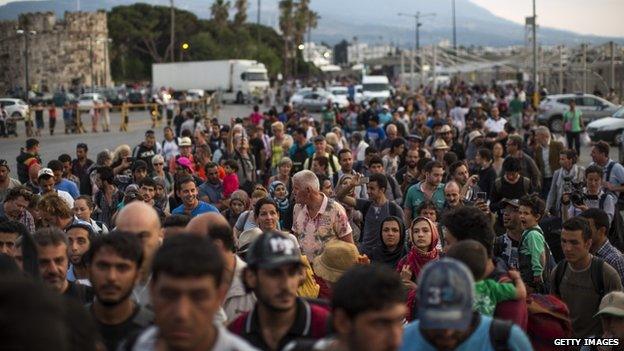
Hundreds of people board a ferry from Kos to Athens
The European Commission vice-president Frans Timmermans says the quota system should "give meaning to what intra-EU solidarity should look like".
But no-one seems happy with the plan.
Everyone can see that Italy and Greece need help, but no-one wants to be told how many refugees to take in.
France and Germany, which together would be expected to receive more than 30% of the relocated refugees, have asked for "fairer burden-sharing", and that greater emphasis be placed on the number of asylum seekers already taken in.
The French interior minister, Bernard Cazeneuve, also said he was calling for waiting centres in Italy and Greece, where "illegal economic migrants" could be distinguished from "those who are persecuted and therefore covered by asylum law".
The Polish prime minister has said she opposes mandatory quotas and that it's up to member states to make their own decisions.
Spain says the commission has not taken adequate account of its 23% unemployment rate or the problems it's having with its own undocumented migrants. Bulgaria feels similarly neglected.
The fact that under EU law, Britain, Ireland and Denmark will all be exempt from the scheme adds to the sense of general discontent among those who aren't.
What else is the EU proposing?
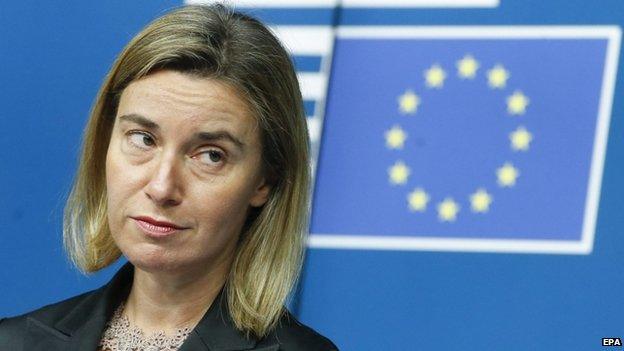
Federica Mogherini wants action soon
The other controversial aspect of the EU's plans involves disrupting the smuggling networks involved in bringing desperate migrants across the Mediterranean, often in appalling conditions.
This is due to be discussed later in the month and agreed, the commission hopes, at a leaders' summit on 25-26 June.
The EU's foreign policy chief, Federica Mogherini, has described this as an operation "to disrupt the business model", involving intelligence-sharing and the inspection and possible destruction of smugglers' boats.
Unveiling the unprecedented proposals in mid-May, Ms Mogherini stressed the urgency of getting the plan off the ground within a matter of weeks.
"In these operations, seasons are important," she said. "People are travelling."
Will the operation begin soon?
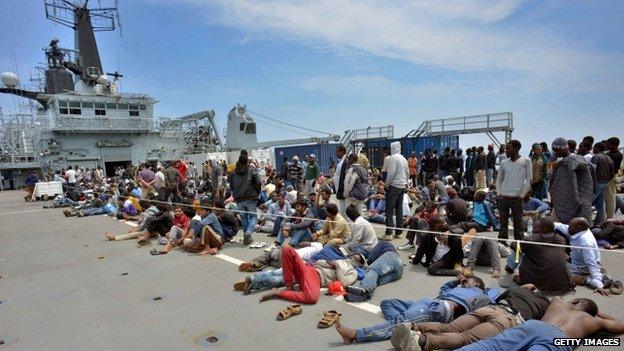
The Royal Marines rescued these people trying to reach Italy from Libya
A month on, a number of European navies are involved in rescuing migrants and the number of people drowning at sea has fallen.
But the plan to disrupt the smugglers seems deadlocked.
Libya's internationally recognised government has yet to agree to a plan that would involve operations in Libya's territorial waters and, conceivably, on Libyan soil as well.
Russian objections also mean that the chances of getting UN authorisation of a military operation are slim.
UN officials tell me that a British-led effort to get a Security Council resolution has, for now, been put on hold.
With UN-sponsored talks aimed at achieving a power-sharing deal in Libya still delicately poised, officials involved are extremely wary of anything that could make their job even harder.
Are there potential longer-term solutions?
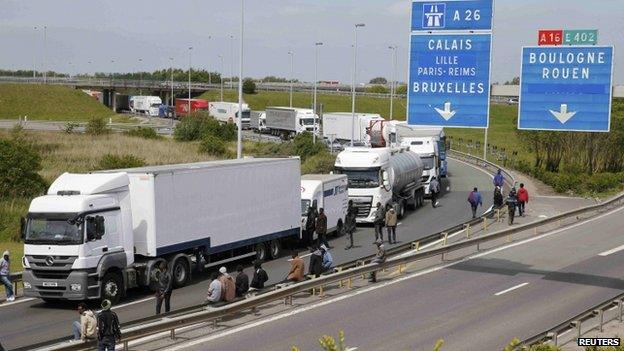
Migrants try to make a clandestine crossing from France to England
No-one thinks that plucking drowning migrants out of the sea, offering resettlement and relocation to 60,000 of the most vulnerable and going after the smugglers' boats represents a comprehensive solution.
The European Commission's Agenda on Migration, external talks about managing the crisis "in all its aspects".
It talks about improving the EU's skilled labour migration policies (the so-called Blue Card Directive) and working with countries of origin and transit to prevent hazardous journeys.
Calls for so-called "asylum camps" in north African countries have been made for the past 10 years, particularly among front-line states such as Italy and Spain.
But there seems little real appetite, on either side of the Mediterranean.
The commission's talk of "a new model of legal migration" could also prove controversial.
The agenda acknowledges that it's up to member states to make their own decisions on economic migrants but talks about the possibility of creating an "EU-wide pool" of qualified migrants, accessible to both employers and authorities.
At a summit in Malta in the autumn, talks will be held with African Union countries to look at the causes of migration.
But the language of the agenda highlights the vast scope of the task.
"Many of the root causes of migration lie deep in global issues which the EU has been trying to address for many years," it says.
At a time when governments are scrambling simply to save lives and find countries willing to host a few thousand refugees, addressing the root causes of this complex humanitarian phenomenon seems almost impossibly ambitious.